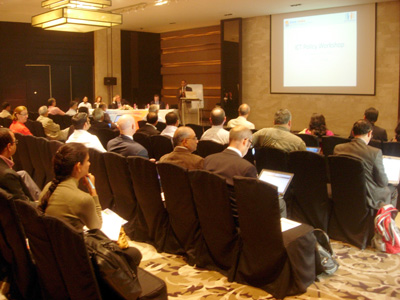by Juanita Kakoty and Nicholas Ferguson
Euro-India SPIRIT and SYNCHRONISER two EU-funded projects dedicated to synergising and strengthening EU-India relations in ICT research and innovation organised a joint ICT Policy Workshop on 10 November 2010 in India.
Modern healthcare is becoming more and more reliant on Information and Communication Technologies (ICT) which offer a variety of benefits such as increased efficiency, a decrease in overall healthcare costs and improvements in patient safety. The growth of ICT solutions for healthcare is a global trend that is reflected in India, where the technology is seen as a key enabler in scaling up and managing networks of hospitals as the market for affordable healthcare in India grows. The social significance and possible implications of this is widespread and could reach underprivileged and rural sectors of Indian society for who affordable healthcare is often not yet a reality.
The topic of ICT for healthcare and the broader issue of how ICT can address Societal Challenges were just two of the issues discussed at the Euro-India SPIRIT and Synchroniser ICT policy joint workshop held on 10 November at SurajKund Delhi NCR. The event enabled ICT experts and stakeholders from Europe and India to discuss and deliberate upon issues that have direct bearing on ICT policies formulated in the two regions. The insights that emerged outline a roadmap of thematic concerns for future collaborative research, and pronounce the strong need to engage the respective governments and industry practitioners in an active ICT policy dialogue.
In the build up to the workshop an intensive meeting of Euro-India SPIRIT experts took place the day before focusing on shaping EU-Indian ICT policy in three main areas ICT Addressing Societal Challenges, AudioVisual Media and Internet, and Emerging Technologies and eInfrastructures. The group consolidated the findings and results of previous meetings to leverage joint cooperation between EU and India in areas that offer mutual benefits for both sides. Areas recommended for future collaborative research include: boosting e-Healthcare capacities; investing in secure and dependable ICT infrastructures; broadband research capacities pertinent to both EU and India; ICT applications in disaster management; e-Services like multi-lingual content and cloud computing; data acquisition, dissemination, storage and management; issues of security and trust; and empowering end users.
Comprehensive discussions on policy measures to fund and promote research kept the experts’ discussions animated, as did the talks that stressed the importance of addressing a validation scenario right at the stage of formulating research proposals. The importance of adding local depth to a global infrastructure was also repeatedly highlighted during the course of the meeting.

Participants of the joint ICT Policy Workshop.
The ICT joint Workshop itself welcomed over 50 participants including key stakeholders from the Indian Government, European Commission, academia, industry, civil society, researchers and practitioners discussed and reflected upon joint research possibilities in the domain of ICT for Development between the European Union (EU) and India. With a keynote presentation on Indian ICT Policy Issues from Dr. G Narendra Kumar, Joint Secretary Performance Management Division, Cabinet Secretariat, the exclusive invitation-only forum aimed to maximise the effects and benefits of policy dialoguing among stakeholders and experts from EU and India. Alvis Ancans, International Relations Officer, European Commission, highlighted the structure of FP7, including a breakdown of funding areas focusing on ICT; by outlining the various types of support that the European Union offers for international collaboration; and by listing the Indian organisations that have been successful so far in FP7 ICT Calls such as FICCI, IBM India, CDAC , EIRC and IIT Delhi and Bombay.
Participants from elaborate discussions that dwelt upon how societal challenges in India could be applied to the Seventh Framework Program (FP7). They also took back home practical ways to transform research ideas into EU-funded projects.
As an outcome of the two-day intensive exercise, Euro-India SPIRIT re-aligns its priority to drawing expertise and knowledge from the industry practitioners. This would allow real use case scenarios to be discussed, showcasing benefits and pinpointing real challenges on the ground.
In the coming year SYNCHRONISER will publish and promote the long term research perspectives and trends study in India that has been identified by the Indian high level visionaries while Euro-India SPIRIT will issue a policy recommendations document from the experts findings.
Both projects will actively participate in a series of ICT events to be hosted in India in 2011. Working Group experts will interact with stakeholders from the government, industry, academia and civil society on issues pertaining to ICT societal challenges in the country, technology application concerns, application of European research results, and ICT policy matters.
The two projects will then consolidate the identified priority research themes between India and Europe to create an enduring collaborative R&D framework between the two regions. Policy recommendations will be submitted to the Ministry of Communications and Information Technology, Government of India and to the Directorate General for Information Society and Media, European Commission. The document will highlight themes for joint EU-India research collaborations and innovation in the field of ICT for development.
The Euro-India SPIRIT project is coordinated by ERCIM.
Links:
http://www.euroindia-ict.org
http://www.synchroniser.org
Please contact:
Florence Pesce, ERCIM Office, France
E-mail :
Katja Legiša, TESEO Sprl, Belgium
E-mail:










